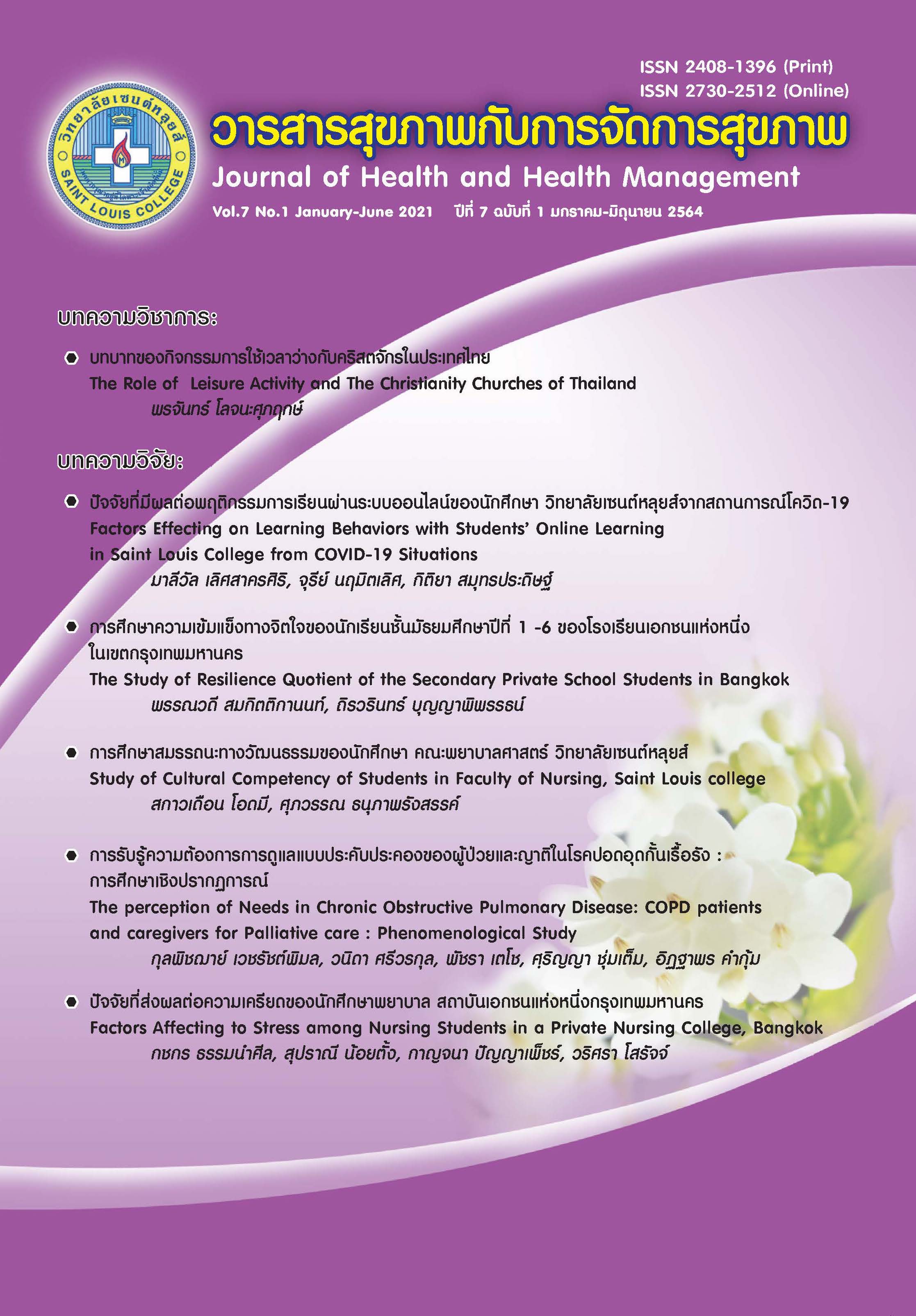The Study of Resilience Quotient of the Secondary Private School Students in Bangkok
Keywords:
Resilience Quotient, secondary school studentsAbstract
The purposes of this survey research were to study 1. the Resilience Quotient study of secondary school students and 2. the comparison of the Resilience Quotient among: age range of 13-15 years and 16-18 years, sex of male and female, education level of junior high school and senior high school, male and female of junior high school, and male and female of senior high school. The total of 154 research samples were selected by purposive sampling comprised of secondary school students of a private school in Bangkok. The Measurements used in this study consisted of Resilience Scale (RS - 15, 13 - 18 years) developed by Department of Mental Health, Ministry of Public Health 1with the reliability of 0.796. Data were analyzed by mean, standard deviation and individual t-test.
It showed that 1.the Resilience Quotient level of secondary school students at age range of 13-18 years devided into 3 levels were high level 1.95 %, moderate level 77.92 %, and low level 20.13 % and 2. the Resilience Quotient among: age range of 13-15 years and 16-18 years, sex of male and female, education level of junior high school and senior high school, male and female of junior high school were significantly different at the statistical level of .05 and the Resilience Quotient between male and female of senior high school were not different.
References
กรมอนามัยร่วมกับไบเออร์ไทย. (2563). รณรงค์สังคมไทยหยุดท้องไม่พร้อม สนับสนุนการตั้งครรภ์อย่างมีคุณภาพในวันคุมกำเนิดโลก 2563. กรุงเทพฯ: บริษัทไบเออร์ไทย จำกัด.
กฤษฎา ศุภวรรธนะกุล.(2563). ท้องในวัยรุ่น ‘ปัญหา’ ของวัยรุ่น หรือ ‘ปัญหา’ ของผู้ใหญ่. อุดรธานี:มูลนิธิภิวัฒน์สาธารณสุขไทย.
กองส่งเสริมและพัฒนาสุขภาพจิต กรมสุขภาพจิตกระทรวงสาธารณสุข. (2562). คู่มือสร้างสรรค์พลังใจให้วัย ทีน (พิมพ์ครั้งที่ 1). กรุงเทพฯ: บริษัท บียอนด์ พับลิสชิ่ง จำกัด.
พรวิไล ปัญญาวงค์. (2561). การตรวจสอบความเที่ยงตรงโมเดลการวัดความเข้มแข็งทางจิตใจของนักกีฬาเยาวชนลาว (วิทยานิพนธ์ปริญญาวิทยาศาสตรมหาบัณฑิต). มหาวิทยาลัยบูรพา, ชลบุรี.
แผนงานสร้างเสริมสุขภาพจิตเพื่อสุขภาวะสังคมไทย. (2552). คู่มือการใช้ VCD สื่อการเรียนรู้เรื่องเติมเต็มความ เข้มแข็งทางใจชุด 2 (พิมพ์ครั้งที่ 1). นนทบุรี: กระทรวงสาธารณสุข.
สำนักงานกองทุนสนับสนุนการสร้างเสริมสุขภาพ. (2561). สถานการณ์น่าห่วง วัยรุ่นไทยติดเชื้อ HIV สูงขึ้น. กรุงเทพฯ: อาคารศูนย์การเรียนรู้สุขภาวะ.
ศรีสุดา วนาลีสิน, วิลาวรรณ คริสต์รักษา, และ ไผโรส มูฮัมหมัดสกุล. (2562). ความแข็งแกร่งในชีวิตของนักเรียนมัธยมศึกษาในจังหวัดภาคใต้ตอนล่าง. วารสารการพยาบาลจิตเวชและสุขภาพจิต, 33(1), 111-127.
Evans-Whipp, T., & Gasser, C. (2019). Growing Up in Australia: The Longitudinal Study of Australian Children (LSAC), Annual Statistical Report 2018.
Nourian, M., Shahboulaghi, F. M., Tabrizi, K. N., Rassouli, M., & Biglarrian, A. (2016). Resilience and its contributing factors in adolescents in long-term residential care facilities affiliated to Tehran Welfare Organization. International journal of community based nursing and midwifery, 4(4), 386.




